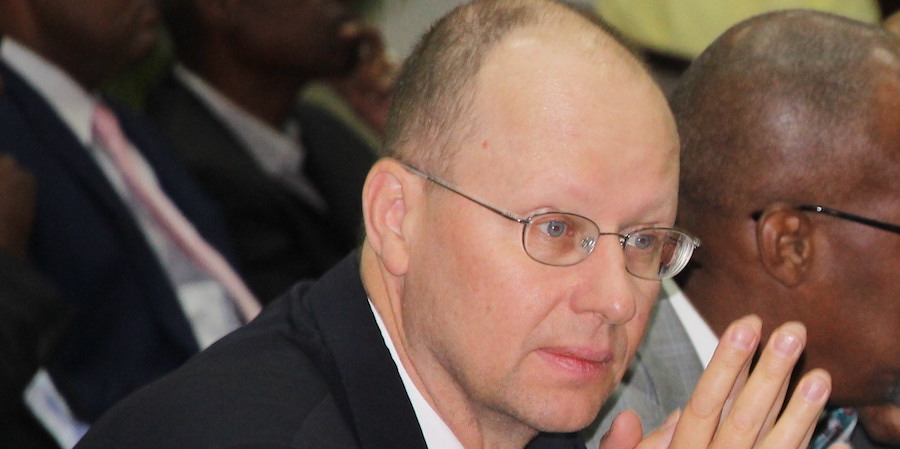The way seems clear for the Mia Mottley administration to draw down its third installment of US$50 million under a US$300 million International Monetary Fund (IMF) loan to finance the Barbados Economic Recovery and Transformation (BERT) programme.
The IMF’s Deputy Division Chief for the Caribbean Bert Van Selm told Barbados TODAY on the sidelines of a Regional Economic Outlook presentation at the Courtney Blackman Grande Salle of the Barbados Central Bank this afternoon that he is optimistic the Executive Board would approve disbursement of this latest tranche when it meets next month.

Bert Van Selm
“Everything looks good…the numbers look good,” he assured.
Van Selm had earlier told the specially-invited guests for the presentation that an IMF mission was currently in Barbados for two weeks for consultations with the Government to review the status of the BERT programme.
He also said the team hoped to submit its findings to the Executive Board in December this year, but would be in a position to provide more details at the end of their visit here next week Friday.
On June 24, 2019, the board completed the first review of Barbados’ economic reform programme.
The senior IMF official also told Barbados TODAY that under the IMF agreement, this country is expected to receive four tranches of US$50 million and an equal number for US$25 million over the four-year life of the Extended Fund Facility (EFF) arrangement.
The BERT programme is aimed at restoring fiscal and debt sustainability, addressing falling reserves, and increasing growth. The programme seeks to protect vulnerable groups through strengthened social safety nets.
In his assessment of this country’s performance so far, the IMF official had good news with respect to the problem of transfers to state-owned enterprises (SOEs), a situation which had been draining millions from the Treasury.
“We believe [the Government] is on the right track to bringing those transfers under control and balance its books under the fiscal policy,” he said.
Van Selm described the transfers as a big problem for many years especially where revenue was concerned.
He acknowledged that the Government has tried and is in the process of addressing that “very high” level of transfers by implementing a number of measures including higher tariffs for some services such as increased bus fares and user fees on health services and hotel rooms.
“We expect that under the BERT programme the transfers to state enterprises would continue to decrease and measures put in place to make them more efficient; and that would create more fiscal space for [spending on] something else,” he said. The IMF executive identified spending on capital projects as one alternative area.
He also said the Mottley administration was on track to achieving its planned six per cent primary surplus for 2019/2020 fiscal year.
“On the fiscal side we have seen major improvements over the last year or two…the Government of Barbados had a primary surplus of six per cent of GDP for this year and subsequent years. From what we have seen from data so far this year, they are on track to achieve that,” he revealed.
He said it is possible to make the fiscal adjustments from two and a half per cent primary surplus to six per cent without seeing too much of an impact on growth simply because of this country’s high dependence on the US and Canada.
“What we expect going forward is for growth to become bigger and return to its more natural level of two percent [of] former years. But that’s not to say that growth in Barbados cannot be higher than two per cent of GDP. We believe there are many things that can be done to make Barbados more attractive for investment,” he contended.
“For example, an improvement in doing business can improve the growth rate,” the IMF Deputy Division Chief for the Caribbean stated.
He suggested that attracting “just a few” big investment projects could make a big difference to economic growth.
According to him, the fiscal adjustments introduced by the Mottley administration and the overall economic situation are showing even more improvement.
“And that is driven by the debt restructuring with major cuts in interest payments, both on the domestic side and external side; and that has played an important role in the adjustment process.”
He also said that on the external side reserves were “tight” when this Government took over a “really difficult” situation in May 2018.
He recalled that foreign reserves had declined to a level lower than the debt service for 2017/2018, noting that Barbados was in danger of having its reserves depleted that could have resulted in a devaluation of the local currency.
“But since then, we have seen a major turnaround. The reserves which dipped at just over $2 million in May 2018, are now increased to more than US$600 million with coverage from five to six weeks to three and a half months….quite a decent level of national reserves… and also going forward we expect the debt service obligations of Barbados would be smaller than the international reserves,” he added.
emmanueljoseph@barbadostoday.bb



